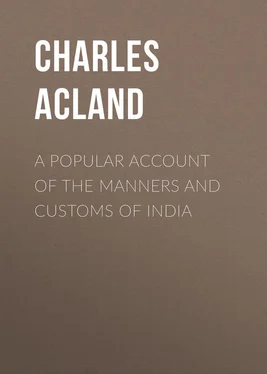Charles Acland - A Popular Account of the Manners and Customs of India
Здесь есть возможность читать онлайн «Charles Acland - A Popular Account of the Manners and Customs of India» — ознакомительный отрывок электронной книги совершенно бесплатно, а после прочтения отрывка купить полную версию. В некоторых случаях можно слушать аудио, скачать через торрент в формате fb2 и присутствует краткое содержание. Жанр: foreign_antique, foreign_prose, Путешествия и география, на английском языке. Описание произведения, (предисловие) а так же отзывы посетителей доступны на портале библиотеки ЛибКат.
- Название:A Popular Account of the Manners and Customs of India
- Автор:
- Жанр:
- Год:неизвестен
- ISBN:нет данных
- Рейтинг книги:5 / 5. Голосов: 1
-
Избранное:Добавить в избранное
- Отзывы:
-
Ваша оценка:
- 100
- 1
- 2
- 3
- 4
- 5
A Popular Account of the Manners and Customs of India: краткое содержание, описание и аннотация
Предлагаем к чтению аннотацию, описание, краткое содержание или предисловие (зависит от того, что написал сам автор книги «A Popular Account of the Manners and Customs of India»). Если вы не нашли необходимую информацию о книге — напишите в комментариях, мы постараемся отыскать её.
A Popular Account of the Manners and Customs of India — читать онлайн ознакомительный отрывок
Ниже представлен текст книги, разбитый по страницам. Система сохранения места последней прочитанной страницы, позволяет с удобством читать онлайн бесплатно книгу «A Popular Account of the Manners and Customs of India», без необходимости каждый раз заново искать на чём Вы остановились. Поставьте закладку, и сможете в любой момент перейти на страницу, на которой закончили чтение.
Интервал:
Закладка:
I was walking out early in the morning, and reached a very large pepul-tree, covered with its red berries. Presently I heard some one chattering over my head, and looking up beheld an enormously long ape as tall as myself, with a white face and great whiskers. He gazed at me for a moment, and then chattered again. The noise becoming louder and louder, I ran from under the tree, and soon saw a great number of these animals of different sizes come leaping down, and, after a stare, as much as to say "don't follow us," they made a few tremendous leaps, and escaped into the jungle.
The Indian buffalo has no hump on its back. It is like an immense black cow, but exceedingly fierce. As yet I have seen only tame ones. A gentleman who lives here was walking out in the jungle the other evening, with the intention of shooting some birds, when he saw before him a large bull buffalo. When alone these creatures are much more fierce than when with the herd. He did not, therefore, much relish his close acquaintance; and, turning round, strove to creep quietly away. Hearing a loud roar behind him, he looked back, and beheld the buffalo in full chase after him, tossing his head most furiously. The gentleman scarcely knew what to do, as there was no tree near into which he might climb; but he was surrounded by low bushes. Turning suddenly round, therefore, he stood still, and, looking steadfastly at the buffalo, loaded his gun. On came the animal, nearer and nearer, looking fiercer and fiercer. At last, when about twenty yards off, he stopped one minute as if in hesitation, and then, with a loud roar, turned his head, and, tearing up the ground with his hoofs, was on the point of rushing onward, when the gentleman raised his gun as a last resource, and fired. The ball entered through the eye into the brain, and the monster rolled over the plain.
I have since seen the skull and the horns, which are of great size. The elephants are very large, and there are none but tame ones here. The major of the regiment quartered at this place has offered to lend us one whenever we are inclined for a ride.
The jackals are a source of great annoyance at night: they come into the compound and howl round the house, and make a dreadful noise, but are not dangerous. There are swarms of wild dogs too here, called pariah dogs – quite harmless. They resemble a hairy greyhound with a fox's head. The flying-fox is a sort of bat. Its large black wings are nearly four feet from tip to tip, and the body is like a small fox. They fly about the trees at night, and pick the fruit and berries. The birds are very beautiful. There are many sorts of doves and pigeons. One sort of the last-named is quite green; as is also the fly-catcher, which has a long single feather in the middle of his tail. The mango is about the size of a pigeon, yellow, with green stripes. There are also the pretty little amadavad, and many others.
I am making a collection of large beetles.
Midnapore is situated on a high table-land, or flat-topped hill, about six miles across, and is much cooler than the greater part of India. The soil is about a foot deep, and underneath it is a volcanic rock, so porous that the rain soaks into it as soon as it falls, thus rendering the place dry and healthy. From the middle of June to the middle of October there are tremendous storms of rain almost every day. Then it is cool and pleasant till February. After that time the heat increases, and the weather is quite dry until April; from which time until June it is intensely hot, with occasional hurricanes and thunderstorms, of which we have had several most magnificent ones lately; and from the height of the hills we seem almost to be in the midst of them.
Indigo, rice, and grain are plentiful. The first is obtained by soaking the leaves of the plant in water until they are rotten, when they deposit a thick blue sediment, which is formed into cakes, and is used for dyeing cloths.
We have some wild silkworms, from which the natives manufacture a coarse sort of silk. The rice grows in fields which are under water, and looks like barley. These fields beautifully illustrate the expression in the Bible about casting your seed upon the waters, and after many days you shall find it again.
The greatest expenses here are servants and house-rent. I pay for my house, which is one of the cheapest in Midnapore, forty rupees a-month; a rupee is two shillings. I keep as few domestics as I can; but am obliged to have eleven men and one woman. The men are —
1 consummar, or headman.
1 kitmajar, or waiter at table.
1 sirdar, who attends to lamps, furniture, &c.
1 bearer, who works the punkah and helps the sirdar.
1 dirgee, or tailor, who mends stockings, and makes gowns, coats, shirts, &c.
2 maistrees, or carpenters.
2 mollees, or gardeners.
1 motee, who sweeps the rooms and keeps them in order.
1 beastee, or water-carrier.
We neither feed nor clothe them: indeed their food consists of nothing but rice, except the consummar and kitmajar, who are Mussulmans. Their pay varies from three to ten rupees a-month. Many people keep forty or fifty men. The sirdar, or bearer, sleeps on a mat in the verandah; the others in houses in the compound. They are all forbidden by their religion to do the work of any other; their fathers and grandfathers performed the same duties, and so will their sons and grandsons also. They are a thievish set, and we dare not leave anything in their way that they can steal.
There is at this moment a little grey squirrel hopping about in the verandah, – facing the gate of the compound are several tame buffaloes, – and a little beyond is an elephant lying down basking in the sun and lashing his trunk about upon the grass.
There is an insect here called the flying-bug; it resembles in appearance a very large ant with wings, and, if one of them flies through the room, it leaves so disagreeable a smell that it can hardly be borne for an hour afterwards.
September 15
To-day is a rustic festival; the carpenters and all other workmen have a holiday, and, daubing all their tools with red paint, cover them with flowers, and then kneel down and worship them, and beg them to work well and not to break during the next year. This is called the "poujah of tools."
October 9, 1842
We have had several thunderstorms here. A few days ago I saw a large black cloud coming up against the wind. Gradually it spread until it covered the whole sky. The wind now died away for a few minutes, and then rose again and seemed to rush from all quarters of the heavens at once, and formed a sort of whirlwind round Midnapore; then from the darkest part of the cloud flashed a vivid streak of lightning, followed almost immediately by a terrific clap of thunder. For three hours the storm continued, and scarcely three minutes elapsed between each clap, while we saw the lightning running along the ground for several yards.
The other morning two men who lived in Midnapore caught a cobra de capello, or hooded snake, and they were examining it when suddenly it bit them both, and they died in the course of half an hour. We have not yet seen any snakes in our house, although most people frequently find them. This, as I think I told you, I attribute to our keeping the mungoose, of which the snakes are much afraid.
The chikary, or huntsman, makes a large oval shield, which he covers over with leaves: in the upper part are two very small holes. When he perceives a bird he crouches down behind his screen, keeping a watch through the two little holes, and creeping on very slowly. When he has approached near enough, he thrusts forward a long thin stick like a fishing-rod, and touches the bird with one end of it, on which there is a little lime; the bird sticks to it, and then the man draws back the pole and secures the animal.
Читать дальшеИнтервал:
Закладка:
Похожие книги на «A Popular Account of the Manners and Customs of India»
Представляем Вашему вниманию похожие книги на «A Popular Account of the Manners and Customs of India» списком для выбора. Мы отобрали схожую по названию и смыслу литературу в надежде предоставить читателям больше вариантов отыскать новые, интересные, ещё непрочитанные произведения.
Обсуждение, отзывы о книге «A Popular Account of the Manners and Customs of India» и просто собственные мнения читателей. Оставьте ваши комментарии, напишите, что Вы думаете о произведении, его смысле или главных героях. Укажите что конкретно понравилось, а что нет, и почему Вы так считаете.












